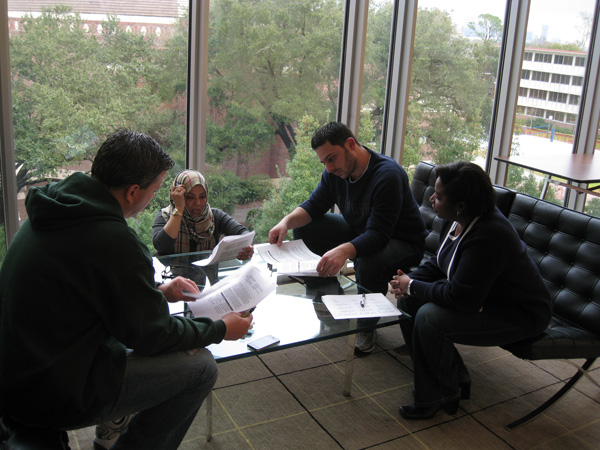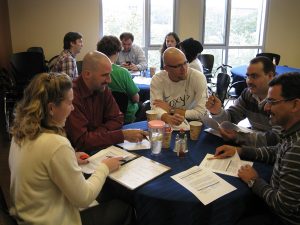
Executive MBA students from New Orleans, Houston, Chile, China, Greece and the United Arab Emirates came together as one class for this year’s International Intensive Week Seminar.
From human rights violations in China to political oppression in the Middle East to arrogance and decadence in the U.S., international news media broadcast negative stereotypes of cultures around the world on a daily basis, but according to a group of Freeman School executive MBA students, those images have little to do with reality.
“When you get into a class like this, with people from similar educational backgrounds, you realize we’re all just normal people,” says Dan Gaines, a solutions engineer with Adecco iSolutions in Houston. “The way things are sensationalized in microcosm is not really the way things are in the macro environment.”
Gaines was one of 126 executive MBAs from New Orleans, Houston, Chile, China, Greece and the United Arab Emirates who came together in January for this year’s EMBA International Intensive Week Seminar.
Since 2006, the Freeman School has combined students from its executive MBA programs around the world for a week of intensive classes and extracurricular activities focused on international team building and leadership. The students share a classroom for two courses—Managing People Internationally and Leadership and Ethics—and work on assignments together as part of multinational teams.
“Business is global, and part of doing business is understanding your market,” says Russ Robins, associate dean for executive education, who organized the event. “To the extent you’re dealing with people from another culture, you’d better get exposed to the way they think.”

EMBA students Jennifer Fredericksen, Dan Gaines, Clayton Smith, Refaat Aboukowik and Leonardo Gonzalez discuss a case during January’s intensive week seminar.
This year marked the first time that students from a predominantly Muslim country participated in the seminar. The 21 visiting students from Abu Dhabi University required a few special accommodations—such as prayer rooms and halal meals—but according to most of the participants, what was most striking about the week wasn’t the differences between cultures but rather the similarities.
“We all care about our families and our countries and our people,” says Leonardo Gonzalez, one of the students from Chile. “Those things are the same for all of us. I think we have more similarities than differences.”
“We’ve done exercises where we’ve taken votes, and nine times out of 10, we’re pretty much in agreement with how we see things,” adds Clayton Smith, one of the students from Houston. “We’ve had a few disagreements along the way, but they were constructive disagreements.”
Perhaps surprisingly, the disagreements over how to handle situations presented in the cases often boiled down to corporate differences rather than cultural.
“It’s more organizational culture—where we work, how things are done at our organizations and what the code of ethics is,” says Jamil Al Turk, one of the Abu Dhabi students. “Of course your own values and where you come from are part of it, but I think most of it is the influence of the organizational culture.”
That’s the kind of insight that makes the International Intensive Week Seminar one of the executive MBA program’s most popular events.
“When we poll our students, this is always one of the best-rated events,” Robins says. “It’s really eye opening for them.”

